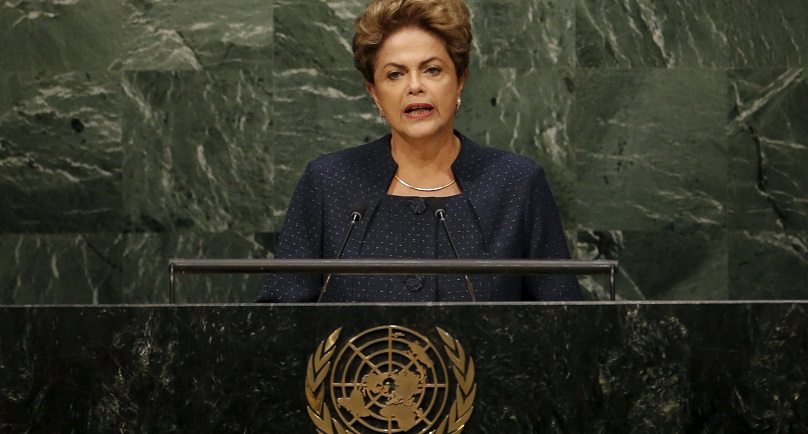Image: Dilma Rousseff, President of Brazil Addresses a plenary meeting of the United Nations Sustainable Development Summit 2015 at the United Nations headquarters in Manhattan, New York September 27, 2015. REUTERS/Mike Segar
By Marcelo Teixeira
(Reuters) – Brazil pledged on Sunday to slash greenhouse gas emissions by 43 percent by 2030 as its contribution to a United Nations climate agreement, but said it will include reductions from past efforts against deforestation to help it reach the target.
President Dilma Rousseff presented the country’s pledges during a speech at the U.N. General Assembly in New York, saying that the targets, based on a reference year of 2005, are more ambitious than those of most developed countries.
Countries are submitting pledges to cut emissions ahead of global climate talks in Paris later this year. So far, those pledges are estimated to limit warming to 3 degrees Celsius.
Scientists say global warming needs to be limited to 2 degrees Celsius (3.6 degrees Fahrenheit) to avoid devastating droughts and rising sea levels.
Rousseff reaffirmed the country’s commitment to ending illegal deforestation in the Amazon, as stated during a joint announcement with U.S. President Barack Obama in June, but fell short of declaring a total freeze on deforestation as many environmental groups had sought.
Estimates from leading researchers on land use change in Brazil indicate legal deforestation could still be carried out in an area of around 100 million hectares, equivalent to the size of Colombia.
Brazil also pledged to offset emissions coming from regulated deforestation, but has not provided details.
“Brazil is one of a few developing countries to commit to an absolute emissions reduction target,” Rousseff said at the U.N.
“We have one of the world’s largest populations and GDP, and our targets are as ambitious or more ambitious than those of developed countries,” she said.
Deforestation worldwide accounts for 15 percent of global heat-trapping gases, or the equivalent of what is emitted by the world’s entire transport sector. Brazil has the largest untouched rainforest in the world.
Brazil also plans to reduce emissions by increasing the share of renewables (excluding large hydroelectrics) in power generation to 23 percent by 2030 from 15 percent currently.
Although Brazil’s target is one of the largest announced by any country so far, the fact that it takes into account huge emissions cuts from the last decade might make it insufficient to prevent a global temperature increase of more than 2 degrees Celsius.
A network of NGOs in Brazil called Climate Observatory had asked for a reference year of at least 2010 for the country’s goals, to signal a renewed effort.
According to SEEG, an independent emissions measuring system, Brazil’s greenhouse gases had already fallen 33 percent from 2005 to 2013 due to successful policies to repress illegal deforestation.
“It’s significant that Brazil, among the world’s largest emitters, has the largest reduction target. But it is insufficient considering the potential the country has to do more,” said Carlos Rittl, head of Climate Observatory.
(Editing by David Holmes and Louise Heavens)
Copyright 2015 Thomson Reuters. Click for Restrictions.


